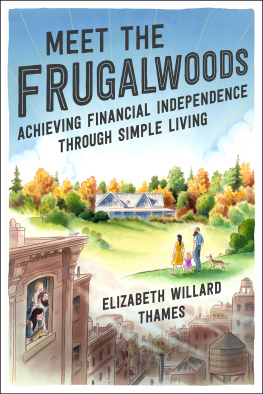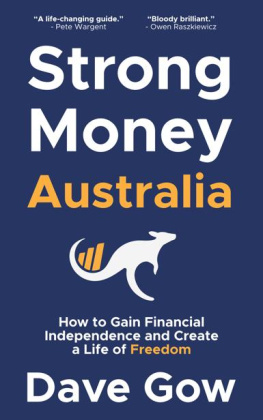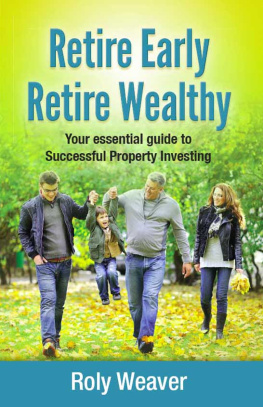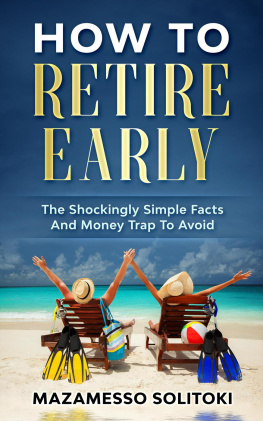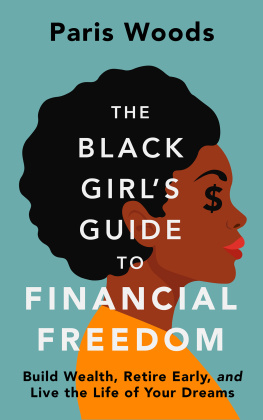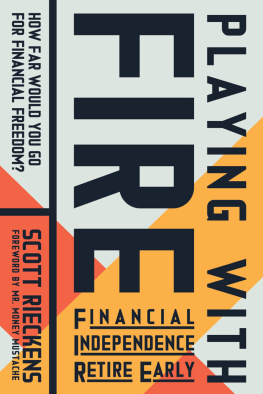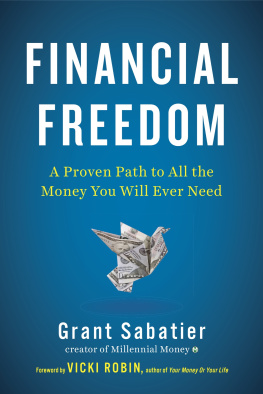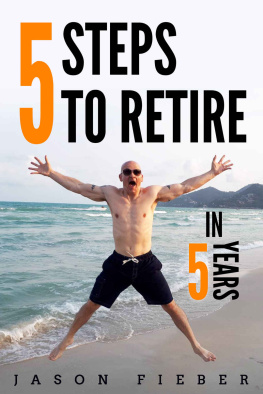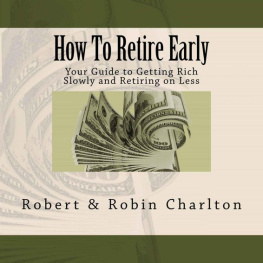Contents
To women everywhere who dont think they can manage their money, who arent confident in their skills, and who underestimate their own worth and intelligence. You are far smarter, far more capable, and far worthier than you realize.
As I write this, Im sitting on the back porch of the rural Vermont homestead I share with my husband and our daughter, gazing out on the sixty-six acres of forest, fruit trees, gardens, ponds, and streams that we feel incredibly lucky to call our own. Just a few years ago, this seemed like an impossible feat. My husband and I were struggling to conceive a baby and attempting to chart a path out of our frenzied nine-to-five grind in urban Cambridge, Massachusetts. We wanted to achieve financial independence, quit the cubicle jobs that made us so unhappy, and create a simpler life of purpose in a rural setting.
This is the story of how we brought that dream to fruition before our thirty-third birthdays. My husband, Nate, and I are not exceptional people. Were not rich or famous or geniuses or even particularly good-looking (although we have our moments). Were just some average, middle-class kids from the Midwest who decided we wanted something more out of life than what our consumer culture sells us. We realized we couldnt buy our way to happiness and that we had to restructure how we lived, what we spent our money on, and how we used our time in order to achieve deep fulfillment and lasting contentment.
Ive heard people say things along the lines of anyone can achieve financial independence and people are poor because they dont work hard enough and my success stems entirely from my own efforts and I disagree with all of those sentiments. While its true that Nate and I are average people, and weve never won the lottery or had investment banker salaries or been the beneficiaries of inheritances or trust funds, Im keenly aware that we are also extraordinarily privileged.
Poverty is a pervasive issue, not only in our country but globally, and its myopic to presume that everyone who is poor doesnt work hard enough or isnt motivated enough. Its often quite the contrary. Many people who live at or below the poverty line work much harder than I ever have or probably ever will. Working two and three jobs in an effort to simply pay rent and buy groceries and send their kids to school in shoes that fit is the punishing reality for many people. Frugality is often already a requirement for those at the lowest end of the economic spectrum and theres simply not enough money coming in every month to save enough to create a stable financial base, let alone an emergency fund or retirement savings or investments. In order to save large amounts of money, you have to have a sufficient amount of money coming in. You cant frugalize income you dont earn.
Without an emergency fund, a savings account, or any type of financial cushion, people who live paycheck to paycheck are in a perilous position. One missed shift can equal a missed rent payment or a missed electricity bill. Compounding this problem is the fact that many economically disadvantaged people lack a bank account, which means theyre unable to take advantage of the lending opportunities or overdraft protections that a large financial services firm can provide.
Its my belief that we, as a country, need a stronger social safety net for the working poor. We need comprehensive medical and dental coverage, we need welfare programs that dont strand families who earn just barely too much money to qualify for housing and food subsidies, we need to care not only for our children and our elderly, but also for adults who strugglefor any number of reasonsto cobble together a livable wage. Im a proponent of exploring a universal basic income, as studies have demonstrated that entrusting people with money of their own often yields tremendous dividends for society as a whole. No one wins when a family has to choose between working a job or safe childcare. No one wins when the only food options in a neighborhood are unhealthy and expensive. No one wins when people are forced to use the emergency room as their primary care physician. As a nation and as a society, I believe we have a responsibility to care for those who experience the greatest need and to create viable pathways out of generational poverty.
I share all of this with you because its easy when talking about ones personal journeywhich is what this book isto extrapolate and make the assumption that if only everyone did as we did, then they too would experience success. But thats not the case. Its naive, presumptuous, and grossly lacking in empathy to assume as much.
In many ways, my privilege and my husbands privilege took root in our lives long before we were even born. Both of our parents had college educations, had good careers, owned homes, and were in happy, financially stable marriages before we were even conceived. These factors all combined to mean that by the time we were born, Nate and I were already several steps ahead of many of the other babies in the hospital that day. Adding to the circumstances of our families is the fact that we were born into safe, middle-class neighborhoods in the United States and thus were the beneficiaries of excellent medical care, superb public schools, plenty of nutritious foods, vibrant public library systems, summer camps, girl/boy scout troops, church communities, horseback riding lessons, ballet classes, basketball teams, and much more.
All of these privileges wove themselves together to form the basis for happy, warm, well-educated, well-cared-for childhoods. We didnt suffer traumas as children. We didnt endure domestic violence. We never experienced food insecurity. We were never homeless. Our electricity and water were never turned off. We were never evicted. We werent exposed to parental drug use or addiction. Rather, we were encouraged, taught to read at home, taken on family trips to art museums and the symphony, shown how to cook and clean, disciplined with fair but firm methodology, taught to play nicely with our siblings, given pets to care for, and above all, loved unconditionally.
These factors are profound in charting a persons course through life and all of these benefits of our upbringings contributed in large part to the successes weve enjoyed as adults. And our privilege doesnt stop there. My husband and I are both white and heterosexual. I wish I didnt have to include these two facts as privileges because I believe that people of all races, religions, genders, ethnicities, backgrounds, and sexual orientations should be treated equally. Sadly, however, that isnt the case in our country and so I have to include these as factors integral to our successes. I wasnt subjected to individual or institutional biases in my applications for college, for graduate school, or for jobs. I was able to succeed in both academics and my career without the strain of racism or homophobia or any number of other prejudices.
While I do think there are elements of my journey through extreme frugality that could be useful to anyone, I also realize that my frugality is elective. I dont have to save as much money as I do. Im not pinching pennies in order to eat. Im not a missed paycheck away from bankruptcy. I choose to be frugal and I choose to live a lifestyle that has granted me financial independence. But its no more due to my own aptitude than the fact that I can read and write. Sure, I had to work hard to learn to read and write, but I also had parents and teachers helping me out at every turn. I wish I could say that if everyone followed my advice, they too could reach financial independence, but thats simply not the case. There are too many layers of institutional privilege enabling my story for it to be replicable for everyone.
There are many people who transcend difficult childhoods to achieve at the highest levels. Who you will grow up to be isnt imprinted at birth or predetermined by who your parents are. But its undeniable that the road was easier for me. I didnt have to overcome anything in order to get where I am today. A memoir can only honestly represent a persons lived experiences, which is why I felt it was important to share all of the ways in which privilege courses through my life.

